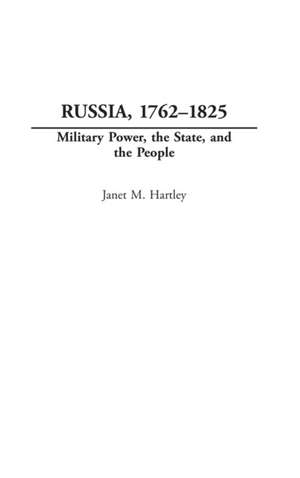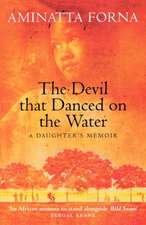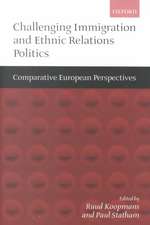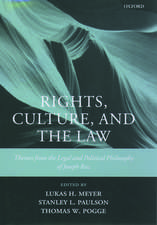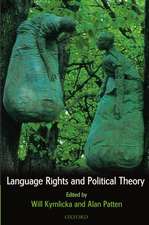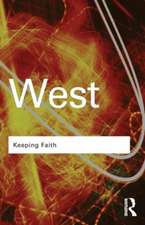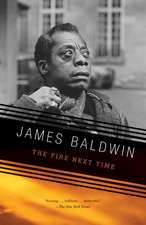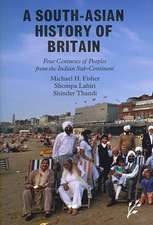Russia, 1762-1825: Military Power, the State, and the People: Studies in Military History and International Affairs
Autor Janet M. Hartleyen Limba Engleză Hardback – 27 feb 2008 – vârsta până la 17 ani
Preț: 439.94 lei
Preț vechi: 570.59 lei
-23% Nou
Puncte Express: 660
Preț estimativ în valută:
84.18€ • 88.21$ • 69.59£
84.18€ • 88.21$ • 69.59£
Carte tipărită la comandă
Livrare economică 11-25 aprilie
Livrare express 06-12 martie pentru 83.22 lei
Preluare comenzi: 021 569.72.76
Specificații
ISBN-13: 9780275978716
ISBN-10: 0275978710
Pagini: 332
Dimensiuni: 156 x 235 x 25 mm
Greutate: 0.64 kg
Editura: Bloomsbury Publishing
Colecția Praeger
Seria Studies in Military History and International Affairs
Locul publicării:New York, United States
ISBN-10: 0275978710
Pagini: 332
Dimensiuni: 156 x 235 x 25 mm
Greutate: 0.64 kg
Editura: Bloomsbury Publishing
Colecția Praeger
Seria Studies in Military History and International Affairs
Locul publicării:New York, United States
Notă biografică
Janet M. Hartley is Professor of International History and Pro Director at the London School of Economics and Political Science. She is the author and editor of many books and articles on Russian history and Anglo-Russian relations in the eighteenth and early nineteenth centiuries. Her books include: Alexander I (1994), A Social History of the Russian Empire, 1650-1825 (1999), and Charles Whitworth: Diplomat in the Age of Peter the Great (2002). She has also written extensively on the impact of the Napoleonic Wars on Russia.
Cuprins
AcknowledgementsIntroduction: Russia at War 1762-18251. The Military Estate: Size and Composition2. The Lower Ranks: Conscription and Community3. The Officer Corps: Service and Challenge to the State4. The Cost: Expenditure and Income5. The Cost: Agriculture, Industry and Trade6. The Impact: Conflict with Civilians in Peace and War7. The State: Administration, Law and Magic8. The Expansion of the State: Conflict, Assimilation. Identity9. Rulers and Armies: Warfare, Image, Culture and Identity10. The Military ColoniesConclusion: Militarization and Modernization?GlossaryAbbreviationsBibliographyIndex
Recenzii
In her by now customary manner Janet Hartley has produced another book that is rich in detail, sensible in analysis, and attentive to the careful reconstruction of historical events. Lucidly written and extensively documented, Russia, 1762-1825 explores the development of Russian military power with reference to state-building and the cost to society. . . . Hartley ends her book with an enlightening and original discussion of the military colonies established by Alexander I and abolished by his successor, Nicholas I. . . . Defeat in the Crimean War showed that Russia's military might could not be sustained without significant economic and social change. Yet until the 1850s Russia remained stable and militarily powerful despite the revolutionary upheavals affecting other parts of Europe. Thanks to the hard work of Janet Hartley, scholars have an intelligent account of why this was so.
Hartley (London School of Economics) puts this significant period of Russian history into perspective by focusing on the connections between the economic growth of Russia and the Russian military. . . . A worthy addition to any academic library. . . . Recommended. All levels/libraries.
[W]e have every reason to welcome Janet M. Hartley's new book, which covers considerable ground.
In many respects, Hartley's examination is a fascinating one. . . Hartley offers an important new consideration of the significance of the Russian military in the society that sustained it during a crucial period.
Hartley (London School of Economics) puts this significant period of Russian history into perspective by focusing on the connections between the economic growth of Russia and the Russian military. . . . A worthy addition to any academic library. . . . Recommended. All levels/libraries.
[W]e have every reason to welcome Janet M. Hartley's new book, which covers considerable ground.
In many respects, Hartley's examination is a fascinating one. . . Hartley offers an important new consideration of the significance of the Russian military in the society that sustained it during a crucial period.
